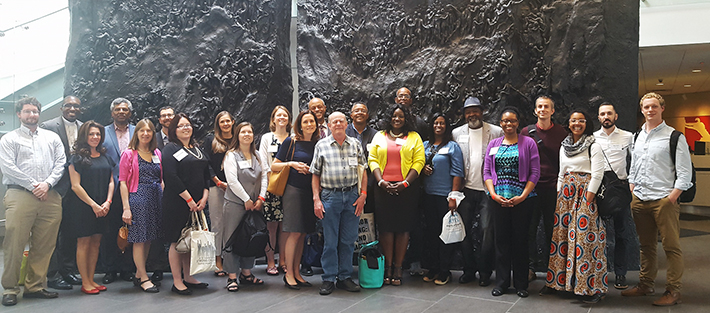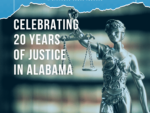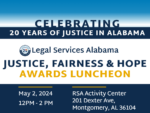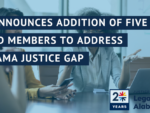The Annie E. Casey Foundation Partnership Conference attendees from around the country enjoy the National Civil Rights Museum in Memphis (Appleseed’s Frank Knaack, 4th from right, Pickett, center).
The Annie E. Casey Foundation held its Southern Partnership to Reduce Debt Convening on May 8-10 in Memphis. Representatives from Legal Services Alabama (LSA), Jaffe Pickett, and Alabama Appleseed Center for Law and Justice, Frank Knaack, attended the conference covering high cost products, medical debt, public sector fines and the complexities of debt collection.
As reported at the conference, Appleseed and LSA, along with other partners, have collaborated to offer consumer clinics throughout the months of May and June providing free educational material and free civil legal advice and services to low income individuals who owe court fines and fees and have used payday lending to pay these fines and face tax debt issues among others. Clinic were held in Tuscaloosa, the Black Belt, Huntsville, and Greater Birmingham in May. Future clinics are planned for Mobile and Montgomery in June.
Jaffe Pickett, LSA Deputy Director, believes these clinics are critical to the area.
“Legal Services Alabama, Alabama Appleseed, TASC, and Greater Birmingham Ministries received grant funding from the national Annie E. Casey Foundation,” Pickett said. “The collaborative has been hosting clinics with local partners across Alabama to provide consumer law services, low income tax services, and voter right restoration services. Credit unions will be at the clinics to offer alternatives to high interest loans; and key to the clinics, will be surveys to gather critical data on individuals forced into borrowing money to pay for court fines and fees.
“The conference provided a historical context and deeper connection to race equity and economic justice, and the backdrop of having that critical discussion against the backdrop of the National Civil Rights Museum, was an added bonus” she said. Pickett also noted, “LSA is so proud to be a part of this partnership and Frank and I both received great feedback from attendees across the country on Alabama’s partnership project at the Conference this month. There was also great interest in the results of the survey that Appleseed will be publishing.”
Frank Knaack, Executive Director of Alabama Appleseed, stated its partnership with LSA is crucial.
“Legal Services Alabama not only provides essential representation to their clients, but also to partner organizations like Alabama Appleseed,” Knaack said. “As an organization focused on public policy reform, we rely on LSA to connect us with individuals who face the actual harms caused by the policies we seek to reform. Our partnership with LSA strengthens our ability to educate lawmakers, and the public, about why Alabama must build a smarter, fairer, and more just criminal justice system, and why all Alabamians must have access to quality, adequately funded counsel.”
Carol Naylor, retired Municipal Court Clerk for the City of Tuscaloosa Municipal Court after 39 years, volunteered at the LSA & Alabama Appleseed Clinic held in Tuscaloosa on May 4.
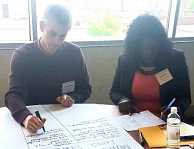
Frank Knaack, Executive Director of Alabama Appleseed, and LSA Deputy Director Jaffe Pickett, strategize during a breakout session at The Annie E. Casey Southern Partnership to Reduce Debt Convening May 8-10 in Memphis.
Naylor said she sees clients who owe court fines and fees on a daily basis. Over the course of the year, Naylor stated, the court sees roughly 20,000 people – who have parking tickets, minor traffic violations, and misdemeanor criminal charges. The consumer clinics, Naylor believes, are much-needed.
“It is very important, because now [people] are aware that there is help out there for them,” Naylor said. “A lot of people that come in [to municipal court] are not aware of the extra help that is given. This is helping those who don’t have the know-how to solve their own legal problems.”
Pickett believes a person’s financial status should not be the determining factor in their ability to pay money owed, “In 1983, the U.S. Supreme Court ruled in Bearden v. Georgia that people can’t be sent to jail simply for being too poor to pay fines and fees, so we know that a person’s economic status shouldn’t determine innocence or guilt, but it is one of the main determining factors in a person going to jail or prison, and people are choosing to enter into detrimental economic spirals to pay fines and fees fearing going to jail.” She said.
“Court fines and fees have increased in almost every state over the last decade, and for low income people who are already stretching expenses like transportation costs to get to work, rent or mortgage, utilities, and the costs to feed a family, there is no room left to pay off these fines and fees; yet even when our clients cannot ‘afford’ a high interest loan, they will make the difficult choice to dig into debt to stay out of jail.”
According to the 1983 U.S. Supreme Court case ruling of Bearden V. Georgia, A person could be sentenced only if he or she had the money to pay a court fine, and purposefully refused to pay.
According to Alexes Harris, Sociologist with the University of Washington, groups most likely to face arrest and go through the courts are indigent and tend to be “people of color, African Americans and Latinos. “These are already very poor and marginalized people in our society, and then we impose these fiscal penalties to them and expect that they make regular payments, when in fact the vast majority are unable to do so.”
For more information about the clinics or to participate in the high interest loan survey, please contact Desiree Taylor, LSA Communications and Community Development Coordinator, at 334-832-1427, or Appleseed’s Leah Nelson at 334-263-0086.
